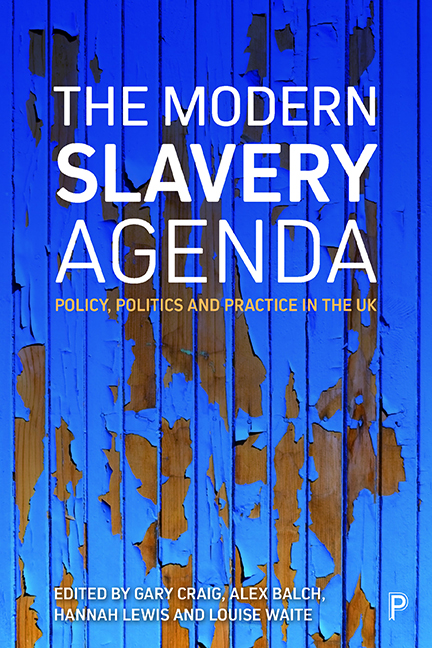Book contents
- Frontmatter
- Dedication
- Contents
- List of tables, figures and boxes
- Notes on contributors
- Editorial introduction: the modern slavery agenda: policy, politics and practice
- one Modern slavery in global context: ending the political economy of forced labour and slavery
- two The UK’s response to modern slavery: law, policy and politics
- three Defeating ‘modern slavery’, reducing exploitation? The organisational and regulatory challenge
- four Class Acts? A comparative analysis of modern slavery legislation across the UK
- five Child trafficking in the UK
- six Human trafficking: addressing the symptom, not the cause
- seven Still punishing the wrong people: the criminalisation of potential trafficked cannabis gardeners
- eight Modern slavery and transparency in supply chains: the role of business
- nine Migrant illegality, slavery and exploitative work
- ten The UK’s approach to tackling modern slavery in a European context
- Index
Editorial introduction: the modern slavery agenda: policy, politics and practice
Published online by Cambridge University Press: 20 April 2022
- Frontmatter
- Dedication
- Contents
- List of tables, figures and boxes
- Notes on contributors
- Editorial introduction: the modern slavery agenda: policy, politics and practice
- one Modern slavery in global context: ending the political economy of forced labour and slavery
- two The UK’s response to modern slavery: law, policy and politics
- three Defeating ‘modern slavery’, reducing exploitation? The organisational and regulatory challenge
- four Class Acts? A comparative analysis of modern slavery legislation across the UK
- five Child trafficking in the UK
- six Human trafficking: addressing the symptom, not the cause
- seven Still punishing the wrong people: the criminalisation of potential trafficked cannabis gardeners
- eight Modern slavery and transparency in supply chains: the role of business
- nine Migrant illegality, slavery and exploitative work
- ten The UK’s approach to tackling modern slavery in a European context
- Index
Summary
Introduction
Until very recently – the last 15 years or so – common understandings of slavery related to its historical manifestations. Every major empire in the world – Egypt, Greece, Rome, Britain, Ottoman, Muscovy and China – was literally built on the back of slaves, usually associated with military and religious conquest. It is only in this last short period that the renaming of severe forms of exploitation, found almost everywhere in the world, as slavery has begun to happen. Even now, many people do not believe that such practices are something that may happen in their own country and often, more or less, ‘In plain sight’. For example, a poll undertaken by the University of Hull of local East Yorkshire (UK) residents in late 2017 discovered that although 75% of those interviewed understood that slavery was something that might happen in their own country now, only 8% had any idea of its scale. In a recent ITV ‘serious’ politics programme, one contributor suggested that ‘modern slavery’ was a myth generated by migrants. Yet, mounting evidence, media coverage and policy and political debate appear to confirm that slavery is, indeed, an alarming, contemporary global phenomenon. To take examples emerging from the chaos of refugees fleeing from conflicts in the Middle East and North Africa; it is clear now that thousands of young people, many unaccompanied, making the hazardous journey to seek asylum in Western Europe have disappeared, often linked to human trafficking, and some parts of the media are reporting on what they are terming ‘slave auctions’ in Libya (CNN 2017). In both cases, the language of slavery is being used to describe consequences derived from Europe's system of borders and immigration controls (O’Connell Davidson 2017a). The metaphor of ‘Fortress Europe’, once dismissed by scholars as exaggerating the capacity of states to exclude (Geddes 2003: 175), has become tragically real, demonstrating the hypocrisy of liberal-democratic structures when it comes to the treatment of vulnerable newcomers (Balch 2016; see also The Observer, 2018).
In this context, this introductory chapter notes the recent heightened profile of the term ‘modern slavery’ in the UK. Various phenomena, practices and policies have been bundled together under this term. This requires careful analytical and critical attention.
- Type
- Chapter
- Information
- The Modern Slavery AgendaPolicy, Politics and Practice in the UK, pp. 1 - 28Publisher: Bristol University PressPrint publication year: 2019



